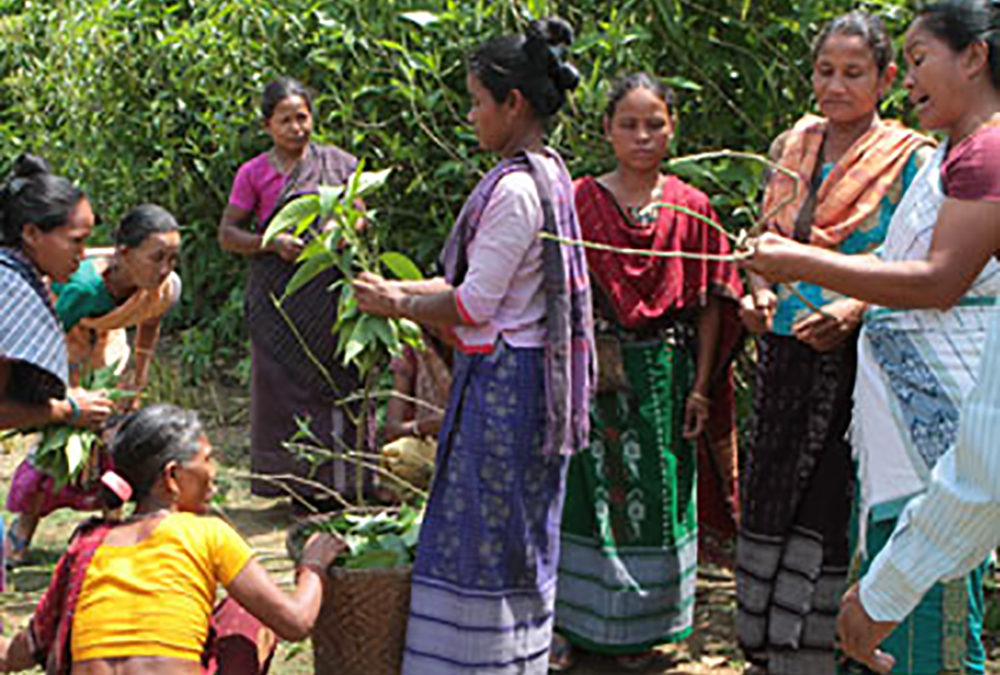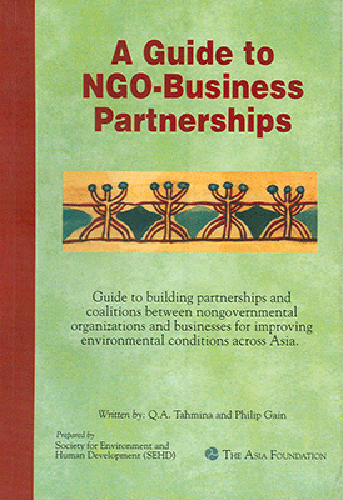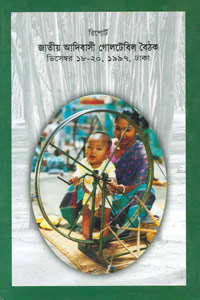
Organic Farming Training for Garo Women
SEHD conducted a training session for members of Simsaka, a Garo woman group engaging in ecological farming with SEHD, on how to raise Basak (Malabarnut or Vasak) plants and harvest its leaves, preserve and market. Held on 20 April 2012 at the SEHD nursery in Rajghati village in Modhupur, the practical session was conducted by Mohammad Rafiqul Islam.
 SEHD conducted a training session for members of Simsaka, a Garo woman group engaging in ecological farming with SEHD, on how to raise Basak (Malabarnut or Vasak) plants and harvest its leaves, preserve and market. Held on 20 April 2012 at the SEHD nursery in Rajghati village in Modhupur, the practical session was conducted by Mohammad Rafiqul Islam, a Local Service Provider (LSP) of Uddyag Foundation, an NGO based in Gaibandha and working for promotion of medicinal plant cultivation among the rural people. He demonstrated the techniques of harvesting and preservation of Basak leaves, preparation and planting of its seedlings.
SEHD conducted a training session for members of Simsaka, a Garo woman group engaging in ecological farming with SEHD, on how to raise Basak (Malabarnut or Vasak) plants and harvest its leaves, preserve and market. Held on 20 April 2012 at the SEHD nursery in Rajghati village in Modhupur, the practical session was conducted by Mohammad Rafiqul Islam, a Local Service Provider (LSP) of Uddyag Foundation, an NGO based in Gaibandha and working for promotion of medicinal plant cultivation among the rural people. He demonstrated the techniques of harvesting and preservation of Basak leaves, preparation and planting of its seedlings.
“This plant has become an important source of income for the poor in our locality. A family of four to five members with 200 Basak plants can be self-employed. We have developed a mechanism of marketing medicinal plants including Basak with the pharmaceutical companies and the cultivators never get worried about the fate of their produce,” said Islam explaining the commercial potential of medicinal plants. In a reply to questions from the participants he said, there are around 70 kilometers of roadside Basak plantation in his area. Islam and other LSPs provide the cultivators with technical support.
Mr. Zillur Rahman Khondoker, the executive director of Uddyag Foundation explained the background of his organization’s involvement in medicinal plant cultivation among the poor people. The officials of Uddyag Foundation visited India with INTERCOOPERATION, a Switzerland based organization to gain knowledge about commercial potential of medicinal plants and became convinced about its possible benefits in its working area. With the technical support of INTERCOOPERATION, Uddyag Foundation started the cultivation of medicinal plants in Sahapara Union of Gaibandha Sadar upazila in 2006 and now it has been extended to eight unions among four upazilas of Gaibandha. “In addition to Basak, the farmers are also producing Kalomegh (Creat or Chiretta), Tulsi (Sacred Basil or Holy Basil), Choi and Arshwagandha (Winter Cherry) and all these plants are sent to the pharmaceutical companies namely ACME and SQUARE through LSPs. We are yet to catch up with the demand of the pharmaceutical companies. We urge all of you to promote this cultivation for an extra income and support the preservation of these valuable plants,” said Mr. Khondokar.
Nironto Nokrek, the agriculture supervisor of Church of Bangladesh Social Development Program (CBSDP), a Modhupur based project, shared his knowledge of usefulness and preparation of vermi compost, a much-desired component of ecological farming.
 For years the CBSDP has been trying to make compost manure popular among the farmers in Modhupur. Some farmers have become quite successful with vermi compost. Hamida Begum, a farmer of Aushnara union is one of them. She shared how she has become a role model of making vermi compost and how she has made her family financially solvent. She got training and simple apparatus (earthworms and concrete rings) from CBSDP and started the production of vermi compost primarily for her own use. It later became an earning source for her. Her success has brought her a reputation as well. “It is easy to produce vermi compost once you have started it. I just put kitchen waste, cow dung, and green leaves in sacks to prepare pre-compost, the primary ingredient for production of vermi compost. It takes around 20 days for the waste to rot. Then I transfer it into earthen pot or concrete rings. Sixty to 100 earthworms are good enough to feed on this pre-compost in one pot or ring. Once the earthworms are released in the pre-compost the production of vermi compost begins. This has now become part of my daily routine work,” says Hamida.
For years the CBSDP has been trying to make compost manure popular among the farmers in Modhupur. Some farmers have become quite successful with vermi compost. Hamida Begum, a farmer of Aushnara union is one of them. She shared how she has become a role model of making vermi compost and how she has made her family financially solvent. She got training and simple apparatus (earthworms and concrete rings) from CBSDP and started the production of vermi compost primarily for her own use. It later became an earning source for her. Her success has brought her a reputation as well. “It is easy to produce vermi compost once you have started it. I just put kitchen waste, cow dung, and green leaves in sacks to prepare pre-compost, the primary ingredient for production of vermi compost. It takes around 20 days for the waste to rot. Then I transfer it into earthen pot or concrete rings. Sixty to 100 earthworms are good enough to feed on this pre-compost in one pot or ring. Once the earthworms are released in the pre-compost the production of vermi compost begins. This has now become part of my daily routine work,” says Hamida.
Hamida Begum reports that there is a great demand for vermi compost among the turmeric, ginger and banana cultivators. She and others who produce vermi compost are getting orders for more than what they can produce. “We sell every maund (around 40 kgs) of vermi compost for Tk.300. Given the demand prices of chemical fertilizers we are looking forward to increasing its price. I have earned Tk.70,000 from vermi compost during the last four years, which became a big support to my family,” says Hamida Begum with satisfaction.
The training was a follow-up of previous trainings that SEHD provided to the Garo women in particular who are willing to engage in ecological farming that SEHD has initiated in Modhupur.
April 20, 2012 was a landmark for SEHD to scale up its efforts with ecological farming in Modhupur. SEHD, from this April, is starting ecological farming on 2.1 acres of land. The Garo women, with further training, will be the managers of SEHD’s ecological farming. They will work the land, take care of the medicinal plants and crops. They indeed started cutting the banana plants and cleaning of the debris to prepare soil for the ecological farming.
In his inaugural note the director of SEHD Philip Gain explained the background of the SEHD’s involvement in ecological medicinal plant gardening and the initiative of organic crop production. Other SEHD officials present were Safiullah Safi (project coordinator) and Shekhar Kanti Ray (training and program officer), and Khokon Suiten Murmu (assistant accountant). SEHD initiative of ecological farming in Modhupur is partially supported by Marie Clarie, a premier magazine of fashion and style.


